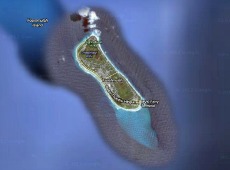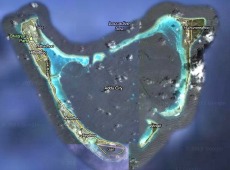Airports Council International (ACI), the global body representing the world’s airports, has advised its members to exercise caution before making any investment in the Maldives relating to Ibrahim Nasir International Airport (INIA).
In an email obtained by Minivan News dated May 8, ACI alerted its members that the Maldivian government is “in the process of transferring the Male’ airport to a wholly-owned subsidiary of MACL and may explore a sale of equity in this entity to another airport operator.”
“ACI members are advised to conduct due diligence while considering any investment in the Maldives, considering the latest developments, uncertainty of outcome of elections, the legal and financial risks of the current arbitration and the nascent legal framework,” the email states.
The cautionary note emphasises that ACI was “not taking sides with respect to the decisions made by the various parties”, and matter-of-factly outlines the government’s sudden termination of the concession agreement with the GMR-Malaysia Airports (GMR-MAHB) consortium to manage and upgrade Ibrahim Nasir International Airport (INIA).
The government declared the 25 year concession agreement ‘void ab initio’ in November 2012 and gave the foreign investors seven days to hand over the unfinished airport to the government-owned Maldives Airports Company Limited (MACL).
While subsequent arbitration proceedings saw the Singapore Supreme Court endorse the government’s right to expropriate the airport, ACI noted that “this was subject to [the government] offering sufficient compensation pursuant to the concession agreement”.
“However on December 8 MACL/Government of Maldives took over the possession and control of the airport without payment of compensation”, the email stated.
ACI informed its members that the takeover was the subject of arbitration proceedings expected to last 9-12 months, and further noted that as the government had guaranteed bank loans used by the developer, these were also the subject of separate proceedings.
With elections scheduled for September, ACI advised it was possible that “any leadership changes arising out of the elections [could] have a material impact of the future of the Male’ airport and the decision of expropriation.”
MACL and MIAL
On March 14, the government declared in a one-line statement that it was establishing by presidential decree a new 100 percent state-owned company, Male’ International Airport Limited (MIAL).
On March 31, President Dr Mohamed Waheed appointed MIAL’s board of directors, including tourism tycoon and Chairman of Universal Enterprises, Mohamed Umar Manik, as chairman, and Island Aviation Chairman Bandhu Ibrahim Saleem as managing director.
Other directors appointed included Thoriq Ibrahim of G. Noomaraahiya, Ahmed Munavvaru of Gaafu Dhaalu Madaveli Gahaa, Abdulla Yazeed of Dhaftharu, and Ibrahim Iyas of Dhaftharu.
The decision to form MIAL last month led GMR-MAHB’s lender Axis Bank to accuse the government of trying to turn MACL into a shell company, and warning it not to transfer MACL’s assets or function while arbitration was pending.
“Given that Axis Bank’s claim under the direct agreement is against MACL, you will understand that Axis Bank views with the greatest concern any attempt to dissipate the assets of MACL in favour of MIAL or any other third party,” wrote Axis Bank’s CEO Bimal Bhattacharyya in a letter copied to MACL and the Ministry of Finance, dated April 22.
“If MACL ceases to manage and operate Male’ airport, and MIAL instead performs that role, then MACL will lose almost all of MACL’s revenue stream, and become a shell,” writes Bhattacharyya in the letter, obtained by Minivan News.
The letter calls on the government to “confirm or deny” its intentions by April 25, and “undertake not to allow any assignment, transfer or disposition of any of MACL’s rights to manage and or operate Male airport to MIAL or any third party… or allow MIAL or any third party to perform any function of managing or operating Male’ airport which is presently performed by MACL” by April 27.
“Please understand that Axis Bank views any dissipation of MACL’s assets with grave concern, and will take the necessary legal action to prevent such a dissipation”, the bank advised.
MIAL’s appointed CEO Bandhu Saleem confirmed to Minivan News that the government did intend MIAL to manage the airport, but said the process of transferring that responsibility over from MACL had run into “hurdles” relating to its current legal issues.
“The board has been appointed, but I have not yet taken on the role,” he said, noting that the new company was waiting on government clearances and had yet to be officially created.
“Until the arbitration is complete, I think it will be very difficult to start a new company,” he added.
Axis Bank loans and compensation claim
A legal submission detailing the Axis Bank dispute, also obtained by Minivan News, notes MACL’s failure to notify Axis Bank of its intention to terminate the concession agreement within 60 days, as required in the bank’s direct agreement.
An included copy of the November 24, 2010 agreement, in which the Ministry of Finance guarantees the loans to GMR-MAHB, is signed and stamped by both then-MACL Chairman Ibrahim Saleem and Finance Minister Ali Hashim on behalf of the government.
The document shows that Axis Bank is seeking the repayment of US$160 million by the government of Maldives due to MACL’s breaching its obligations under the agreement.
At the same time, the governor of the Maldives’ central banking authority recently warned parliament that the Maldives’ gross state reserves had fallen to little more than US$300 million, after the government was compelled to repay a series of US$50 million loans the State Bank of India declined to roll over at the start of 2013.
Repayment of the Axis Bank loan could place the Maldives in a position where it has less than a month of imports in reserve – a potential crisis for an island nation 100 percent dependent on imports for basic subsistence.
The government meanwhile contends that it is not subject to termination and associated clauses relating to a contract it has deemed ‘void from the outset’.
“Under the terms of the direct agreement, these loans would be repayable if the concession was terminated early, as defined in the direct agreement. The government contends, however, that if the concession agreement is void ab inito, then these terms do not apply,” reads a special audit commissioned by the Auditor General.
“Under the terms of the direct agreement, these loans would be repayable if the concession was terminated early, as defined in the direct agreement. The government contends, however, that if the concession agreement is void ab inito, then these terms do not apply.”
Present situation
With arbitration pending and efforts to create a new management company having apparently stalled for the time being, the outlook for the airport remains uncertain.
Much will be dictated by the election in September. Former President Mohamed Nasheed has said he will invite GMR-MAHB to return should his party resume government, while the Progressive Party of the Maldives (PPM) has declared one of GMR-MAHB’s most voracious opponents, ex- Home Minister Dr Mohamed Jameel, as the party’s Vice-Presidential candidate.
The government’s special audit of the project shows the upgrade and construction of the new terminal was 25 percent complete as of October 31, 2013.
“In the meantime, all work on the ground on the improvement to the airport has ceased. Sensitive elements of the new structures that had been planned by [GMR-MAHB] are incomplete and exposed to the weather and at risk of damage – possibly closing off the option of re-using these elements to reduce the cost of any future development of the airport,” the report noted.
Former Transport Minister Dr Ahmed Shamheed, who was dismissed by the government in November 2012, warned in January 2013 the airport needed urgent work to reach acceptable standards, that was outside local capabilities.
“To get the airport to the right level, they will need to bring in outside help,” he told Minivan News at the time.
“The airport is in very bad shape right now and work is needed on the runway, all of which cannot be done without finance.”
Ibrahim Nasir International Airport was meanwhile dubbed the ‘Indian Ocean’s Leading Airport 2013′ at the Indian Ocean World Travel Awards on May 12.

